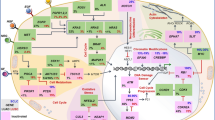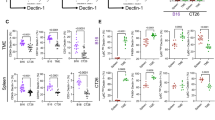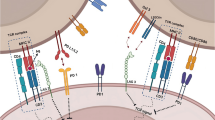Abstract
Background
Up-regulated gene in lung cancer 10 (URLC10), confirmed to be lymphocyte antigen 6 complex locus K and defined as an oncoantigen, has been identified as a tumor-associated antigen by systematic analysis of expression levels of thousands of genes in lung cancer tissues and esophageal squamous cell carcinoma tissues, which were compared with those of normal human tissues by use of cDNA microarray analysis. Human leukocyte antigen (HLA)-A*2402-positive dendritic cells pulsed with URLC10-derived epitope peptide induced CD8+ cytotoxic T lymphocytes to exert specific cytotoxicity against the HLA-A*2402-positive URLC10-expressing esophageal carcinoma cell lines.
Methods
In a phase I clinical trial we evaluated the safety and immunogenicity of a URLC10-177 peptide vaccine emulsified with Montanide ISA51 for patients with unresectable advanced esophageal cancer. One milligram of URLC10-177 peptide in 1 mL sterile saline was emulsified with 1 mL incomplete Freund’s adjuvant and administered subcutaneously to the inguinal region or axilla of the patients. One course of treatment comprised four vaccinations, which were performed every week in the first and second treatment courses and subsequently every 2 weeks after the first vaccination in the third treatment course.
Results
Redness and induration of the skin were the only adverse events at the injection site and were believed to be a delayed-type hypersensitivity (DTH) reaction against the peptide vaccine. A URLC10-177-specific immune reaction in the enzyme-linked immunospot assay was detected in three of four DTH-positive patients (75 %) and in one of three DTH-negative patients (33 %). Furthermore, patients who had a DTH reaction seemed to survive longer than those who had no DTH reaction.
Conclusion
URLC10-177 peptide/Montanide vaccine therapy was well tolerated and induced a URLC10-177 peptide-specific immune response. Therapeutic URLC10-177 peptide vaccination is expected to have clinical benefit in prolonging the survival of patients with unresectable advanced esophageal cancer.




Similar content being viewed by others
References
Enzinger PC, Mayer RJ. Esophageal cancer. N Engl J Med. 2003;349:2241–52.
Tew WP, Kelsen DP, Ilson DH. Targeted therapies for esophageal cancer. Oncologist. 2005;10:590–601.
Jemal A, Siegel R, Ward E, Murray T, Xu J, Smigal C, et al. Cancer statistics. CA Cancer J Clin. 2006;56:106–30.
Foundation for Promotion of Cancer Research. Cancer statistics in Japan Editorial Board. Tokyo: National Cancer Center; 2008.
Pietersz GA, Pouniotis DS, Apostolopoulos V. Design of peptide-based vaccines for cancer. Curr Med Chem. 2006;13:1591–607.
Wood C, Srivastava P, Bukowski R, Lacombe L, Gorelov AI, C-100-12 RCC Study Group, et al. An adjuvant autologous therapeutic vaccine (HSPPC-96; vitespen) versus observation alone for patients at high risk of recurrence after nephrectomy for renal cell carcinoma: a multicentre, open-label, randomised phase III trial. Lancet. 2008;372:145–54.
Kikuchi T, Daigo Y, Katagiri T, Tsunoda T, Okada K, Kakiuchi S, et al. Expression profiles of non-small cell lung cancers on cDNA microarrays: identification of genes for prediction of lymph-node metastasis and sensitivity to anti-cancer drugs. Oncogene. 2003;22:2192–205.
Kakiuchi S, Daigo Y, Ishikawa N, Furukawa C, Tsunoda T, Yano S, et al. Prediction of sensitivity of advanced non-small cell lung cancers to gefitinib (Iressa, ZD1839). Hum Mol Genet. 2004;13:3029–43.
Kikuchi T, Daigo Y, Ishikawa N, Katagiri T, Tsunoda T, Yoshida S, et al. Expression profiles of metastatic brain tumor from lung adenocarcinomas on cDNA microarray. Int J Oncol. 2006;28:75–799.
Taniwaki M, Daigo Y, Ishikawa N, Takano A, Tsunoda T, Yasui W, et al. Gene expression profiles of small-cell lung cancers: molecular signatures of lung cancer. Int J Oncol. 2006;29:567–75.
Yamabuki T, Daigo Y, Kato T, Hayama S, Tsunoda T, Miyamoto M, et al. Genome-wide gene expression profile analysis of esophageal squamous-cell carcinomas. Int J Oncol. 2006;28:1375–84.
Ishikawa N, Takano A, Yasui W, Inai K, Nishimura H, Ito H, et al. Cancer-testis antigen lymphocyte antigen 6 complex locus K is a serologic biomarker and a therapeutic target for lung and esophageal carcinomas. Cancer Res. 2007;67:11601–11.
Suda T, Tsunoda T, Daigo Y, Nakamura Y, Tahara H. Identification of human leukocyte antigen-A24-restricted epitope peptides derived from gene products upregulated in lung and esophageal cancers as novel targets for immunotherapy. Cancer Sci. 2007;98:1803–8.
Kawakami Y, Fujita T, Matsuzaki Y, Sakurai T, Tsukamoto M, Toda M, et al. Identification of human tumor antigens and its implications for diagnosis and treatment of cancer. Cancer Sci. 2004;95:784–91.
Slingluff CL Jr, Yamshchikov G, Neese P, Galavotti H, Eastham S, Engelhard VH, et al. Phase I trial of a melanoma vaccine with gp100280–288 peptide and tetanus helper peptide in adjuvant: immunologic and clinical outcomes. Clin Cancer Res. 2001;7:3012–24.
Diefenbach CS, Gnjatic S, Sabbatini P, Aghajanian C, Hensley ML, Spriggs DR, et al. Safety and immunogenicity study of NY-ESO-1b peptide and Montanide ISA-51 vaccination of patients with epithelial ovarian cancer in high-risk first remission. Clin Cancer Res. 2008;14:2740–8.
Sato Y, Maeda Y, Shomura H, Sasatomi T, Takahashi M, Une Y, et al. A phase I trial of cytotoxic T-lymphocyte precursor-oriented peptide vaccines for colorectal carcinoma patients. Br J Cancer. 2004;90:1334–42.
de Vries IJ, Bernsen MR, Lesterhuis WJ, Scharenborg NM, Strijk SP, Gerritsen MJ, et al. Immunomonitoring tumor-specific T cells in delayed-type hypersensitivity skin biopsies after dendritic cell vaccination correlates with clinical outcome. J Clin Oncol. 2005;23:5779–87.
Jäger D, Jäger E, Knuth A. Immune responses to tumour antigens: implications for antigen specific immunotherapy of cancer. J Clin Pathol. 2001;54:669–74.
van den Eertwegh AJ. Active specific immunotherapy in colon cancer. Recent Results Cancer Res. 2005;165:260–7.
Thallinger CM, Raderer M, Hejna M. Esophageal cancer: a critical evaluation of systemic second-line therapy. J Clin Oncol. 2011;29:4709–14.
Kono K, Mizukami Y, Daigo Y, Takano A, Masuda K, Yoshida K, et al. Vaccination with multiple peptides derived from novel cancer-testis antigens can induce specific T-cell responses and clinical responses in advanced esophageal cancer. Cancer Sci. 2009;100(8):1502–29. (Epub 14 May 2009).
Iwahashi M, Katsuda M, Nakamori M, Nakamura M, Naka T, Ojima T, et al. Vaccination with peptides derived from cancer-testis antigens in combination with CpG-7909 elicits strong specific CD8+ T cell response in patients with metastatic esophageal squamous cell carcinoma. Cancer Sci. 2010;101(12):2510–7. doi:10.1111/j.1349-7006.2010.01732.x. (Epub 28 Sep 2010).
Kono K, Kawaida H, Takahashi A, Sugai H, Mimura K, Miyagawa N, et al. CD4(+)CD25high regulatory T cells increase with tumor stage in patients with gastric and esophageal cancers. Cancer Immunol Immunother. 2006;55:1064–71.
Morse MA, Hobeika AC, Osada T, Serra D, Niedzwiecki D, Lyerly HK, et al. Depletion of human regulatory T cells specifically enhances antigen-specific immune responses to cancer vaccines. Blood. 2008;112:610–8.
Nizar S, Copier J, Meyer B, Bodman-Smith M, Galustian C, Kumar D, et al. T-regulatory cell modulation: the future of cancer immunotherapy? Br J Cancer. 2009;100:1697–703.
Rech AJ, Vonderheide RH. Clinical use of anti-CD25 antibody daclizumab to enhance immune responses to tumor antigen vaccination by targeting regulatory T cells. Ann N Y Acad Sci. 2009;1174:99–106.
Acknowledgments
The authors would like to thank Professor Yusuke Nakamura, Dr Takuya Tsunoda, Dr Koji Yoshida, Mr Ryuji Osawa, and Ms Sachiko Yoshimura, Laboratory of Molecular Medicine, Human Genome Center, Institute of Medical Science, The University of Tokyo, for their excellent advice and cooperation and for providing the peptides.
Conflict of interest
The authors declare that they have no conflict of interest.
Author information
Authors and Affiliations
Corresponding author
Rights and permissions
About this article
Cite this article
Ishikawa, H., Imano, M., Shiraishi, O. et al. Phase I clinical trial of vaccination with URLC10-derived peptide for patients with advanced esophageal cancer. Esophagus 9, 105–112 (2012). https://doi.org/10.1007/s10388-012-0315-y
Received:
Accepted:
Published:
Issue Date:
DOI: https://doi.org/10.1007/s10388-012-0315-y




